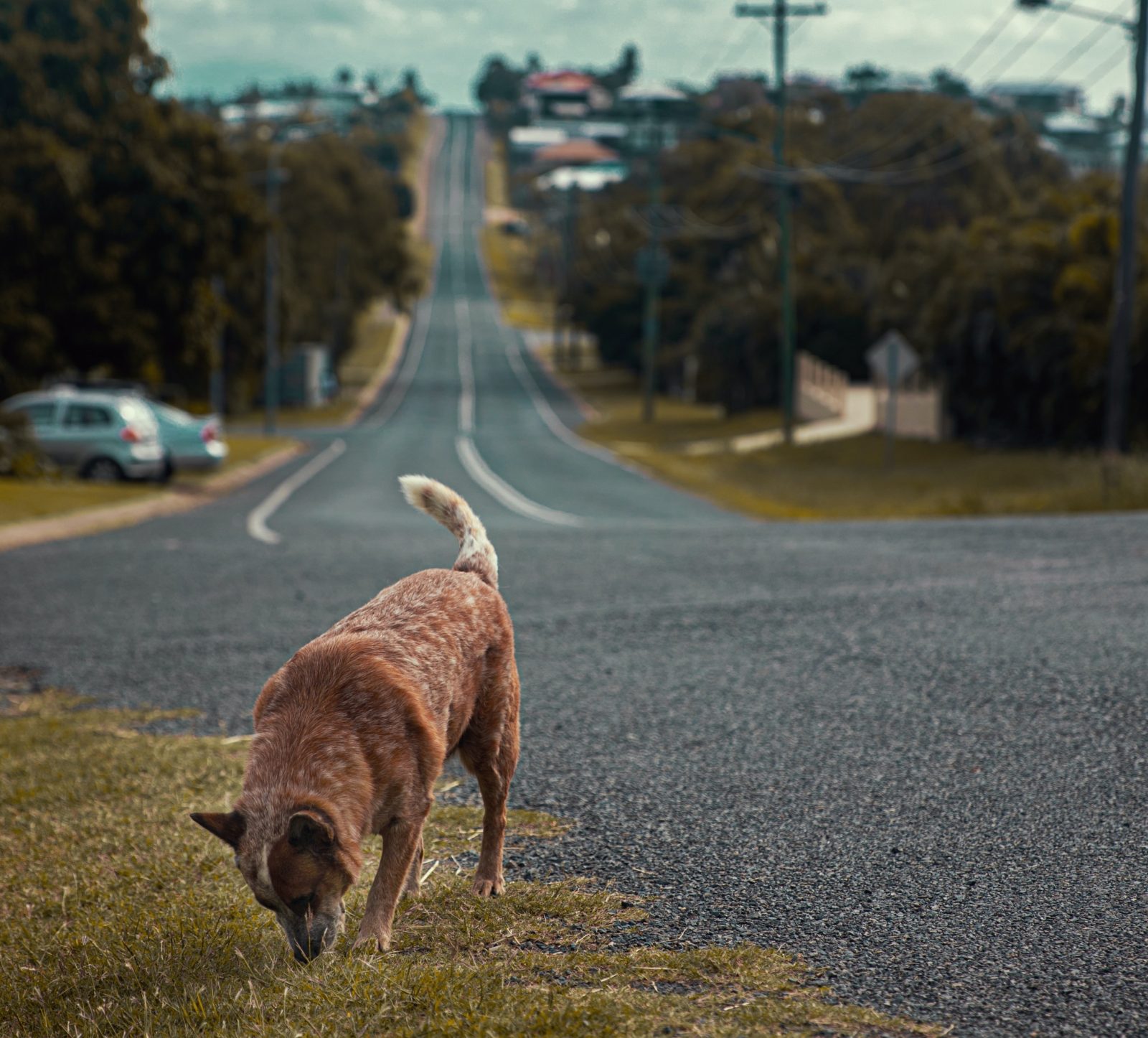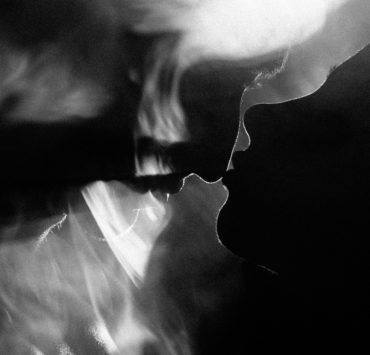
I.
The plain truth is that was the bitch’s name: Quimbamba. My brother showed up at the house one afternoon explaining that his ex-girlfriend had given her to him as a pet. We looked at him unbelieving, but in silence. We’ve mistrusted my brother’s stories for a long time now, since they seemed invented to us, especially those that included imaginary girlfriends. For various reasons that aren’t worth getting into right now, we didn’t say anything nor contradict him. We reacted with fake astonishment, something that didn’t make him feel any shame or embarrassment. We pitied him so we let him get away with it, especially after the beating he got at school.
However, I knew the indisputable truth that my parents were unaware of. The dog was a stray, abandoned, a runt. My old group of friends and I had burned its tail not once but twice. And although that had happened a long time ago, if you looked carefully, you can still see the tip of its tail was still charred, the poor thing. My twin–so different from me in his weakness and his sensibility, he so loved poetry that they called him palesiana, and was such a fan of culpiandeo and the graceful undulations of Jennifer López’s hips (when my parents weren’t looking, he’d imitate her)–announced triumphantly that the dog’s name was Quimbamba. I almost snorted the soda I was drinking out through my nose, but in the face of this, his new invention, I didn’t say a word.
Papá and Mamá, who already planned the mudanza criolla creativa, opposed his having a pet on principle. And I say that about the move like someone deciding to baptize a process as unorthodox as that one was. Moving from the Island should be an easy thing in itself, but moving in the way so many boricuas did it, that was something else entirely. Some called it the proyectazo, the grand project. The procedure had to go like this: first, pack the minimum of clothes, shoes and things, as if we were going to return to the island from a long holiday; two, stop making the mortgage payments (the more months, the better); three, stop making payments on the only car we had left after the sudden sale of Mamá’s (and again, the more months unpaid, the better); four, in the end, let them cut off the cable TV, the electricity, the water supply, and any other monthly service. Having bad credit is the least of it, I heard them say a few months ago to an aunt who’d already gone. They claim that in the United State they’ll give you a house, a car, and utilities even if your credit rating is so low it’s underground. Finally, use the little money that came in to buy the necessities, get the airline tickets, and save for our new life. Although my parents had been laid off due to the financial crisis, their unemployment checks, the food coupons, and the jobs Papá and Mamá did under the table kept bringing in some cash.
We were to go live at first in the house of that cabrón, uncle Félix, and then, when we began to have the small fortune that Papá would manage to amass, we’d buy our own house with an American pool and a few cars. Because in Niuyor everything is better, and Orlando is, without a doubt, the best part of Niuyor. When I say that uncle Félix is a cabrón, that falls short as a description, because a few years ago my twin already accused him of touching him in places he shouldn’t. So the fact that we need to go live in the lion’s fucking cave is just surreal. But that’s what familia is for, Papá always says, to help us in our worst moments. After which, we all bite our tongues and keep quite. All of us except for Quimbamba, who decides to unexpectedly bark her head off, as if my twin had told her everything and she’d understood, and this were part of her protest.
My twin took care of Quimbamba all day, somewhere that wasn’t our house. When he returned in the afternoon or evening, he came back with her having already eaten, drunk, and taken care of her business. Both of them slept together on the same mattress. The dog had a collar that my brother claimed another ex-girlfriend had given her. It had the colors of the rainbow and said in big letters QUIMBAMBA. That damned bitch hadn’t forgotten me. She hates me. She barks at me every now and then, growls at me, bares are teeth at me whenever nobody is watching and I suddenly stretch my leg and give her a kick, which she responds to by howling and running away.
Part of the procedures of the mudanza criolla creativa (regulations already perfected earlier by other neighbors and which we follow because that’s what one does) entailed selling off the belongings and furniture of the house little by little, even if those were still being paid off to the furniture store or the loan house. What was most important, I heard Mamá say, is that the last thing to be sold should be the fridge and the washing machine, for obvious reasons. And I say the last as someone who’s spent entire weeks now sitting on the floor in a living room without a sofa, without chairs, without stools or pictures on the walls, without vases or coffee tables or a television. The oven, the microwave, the dryer, and the beds were all gone. We slept on a mattress on the floor which left our backs aching and we heated canned spaghetti on the little gas cooker that we used during blackouts, whether from a hurricane or not. And although our parents begged us to keep going to school so as not to raise suspicions, the truth is that my twin and I go if we feel like it and otherwise don’t. Almost always, he goes off to the house of his friend and I spend it sitting in a corner of the mall without bothering anyway, watching Kill Bill or Django on my phone, I love those films. Besides, it was almost summer so going to class didn’t matter, so I sometimes observed the girls who passed before me. I fantasized about them, as if I knew them or held their hand… possible imaginary girlfriends, perhaps.
II.
The day we were finally going to move, we set the alarm so it would wake us really early, that way we’d leave for the airport with plenty of time and follow the instructions of the mudanza criolla creative. The sun was barely showing its orange and pink tones when we notified the security guard of our urbanización that we wouldn’t be returning. He phoned some cousins with a pick up truck and they’d take care of removing whatever remained inside the house and the garage, to resell it. Depending on how much money they managed to make off that sale, they’d send us a commission to our new address, that way we all helped one another. When the people from the bank, the loan house, or the furniture store came to try and repossess the properties or goods, they’d find themselves with the surprise that little or almost nothing remained, barely the structure itself. Although not even that would be a surprise, I guess. We just joined a mechanism that had been happening the same way for years already.
In the car, my twin and I travelled in the back seat in silence, as if we were upset. The dog was at his side, stuck in a special suitcase-bag that another girlfriend had given him. He opens his mouth and whispers so only I can hear him: the first time that cabrón tries something, I’ll cut his throat. He says it and lowers his face. I can almost see the tear that doesn’t fall from his right eye. I hold his hand and answer: And I’ll cut him to bits if he dares touch us again.
The car is left in the airport parking lot with a purple piece of paper that Papá places on the front windshield. That lets the employees who are “involved” know that the car will remain there without an owner. Anyone could use it without giving it back to the bank, those bourgeois pigs have enough money already. Some hired hoodlum would come collect it, finding the keys hidden in one of the tires. It would be sold in pieces or the plates changed to be used in some heist.
III.
I don’t manage to make friends in this little neighborhood where everyone speaks boricua. I feel very alone. I’m an odd girl, introverted, who amused herself burning the tails of vagrant dogs and who soon discovers that in this state of the great American nation there aren’t any. Neither dogs, nor friends, nor vagrants. The streets are clean of trash and people. The cars are not left parked in front of the houses, but inside the garages. The yards have their lawns neatly cut and manicured. Although it’s June, I’ve started to attend a new upper school to take English lessons. My twin, unlike me, has already made great friends who seem to understand him and accept him without a girlfriend. No beatings can be spotted in his near future. In secret from Papá and Mamá, he starts going with his friends to parties with colored wigs in disco clubs. That’s why the news catches us by surprise. That’s why we feel such desolation and confusion at what happened.
No one prepares us for it.
IV.
It is the celebration of the Noche Latina. They explain to Papá and Mamá that some nighttime joint gets chosen, sometimes an open-air bar, and some bands or DJs enliven the whole night long with music by Marc Anthony, Celia Cruz, Gloria Estefan, or Shakira. And even by Ricky Martin. That night, the party is at a club called Pulse.
Then the bullets. Then the running, running. The shouts. The friends who try to save one another. The mothers who serve as a human shield so the shots don’t reach their children. The fathers who leave behind so many orphaned boys and girls. The sound of the machine gun and the police, the FBI, the helicopters. The TV and radio station transmitting everything live. Some already talk of massacre, of dozens and dozens of dead and wounded. They narrate the exploits of some trying to escape; the wails, the prayers, the insults of others. The body count: twenty five, thirty two, forty nine… I am not there. I find out about everything from a live broadcast on my phone. Gripped, speechless, frozen in place staring at the screen.
Later I’m witness to the phone call to our home by the hospital staff. Later, I see my parents answering the calls that follow from the morgue.
In our house, even that cabrón uncle Félix is wailing.
I look at Quimbamba and her collar with the colors of the rainbow. That damned dog still hasn’t forgotten about me. She hates me. She barks at me, growls at me, bares her teeth as if asking after my brother. What can you do if the being who you came into the world with is no longer there now? What can one do with this abyss that turns distance into eternity? How can one console oneself knowing that the heart that beat alongside your own inside the womb no longer exists?
Quimbamba barks. She growls. She bites me and blood wells. Then I reach out a hand and grab her. I embrace her too tightly. I almost smother her. I squeeze so tight she howls and it’s only then that I realize that it’s both of us who are howling.

Yolanda Arroyo Pizarro is a Puerto Rican writer. She's published books that promote the discussion of Afroidentity and sexual diversity. She is the Director of the Department of AfroPuertoRican Studies, a performative project of Creative Writing based at the Casa Museo Ashford in San Juan, Puerto Rico. She is also the founder and chair of Ancestral Black Women, in response to the call by UNESCO to celebrate the International Decade for People of African Descent. She was invited by the UN to speak about women, slavery and creativity in 2015 as part of the Remembering Slavery Program. Her short story collection Las negras, winner of the 2013 National Short Story Prize from the PEN Club of Puerto Rico, explores the limits of the development of female characters who challenge hierarchies of power. Caparazones, Lesbofilias and Violeta are some of her works which explore transgression from an openly visible lesbianism. She has also won the Institute of Puerto Rican Culture Prize in 2012 and 2015, and the National Award from the Institute of Puerto Rican Culture in 2008. Her work has been translated into French, German, Hungarian, Italian, and Portuguese.







